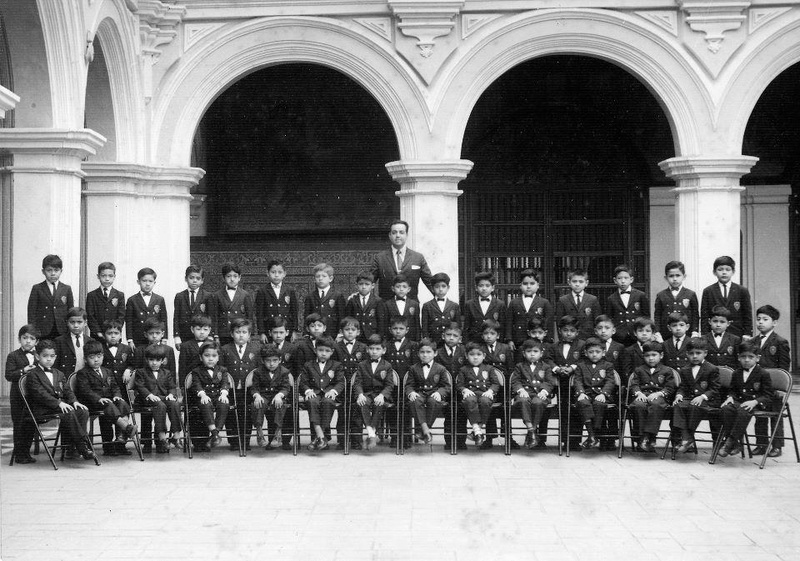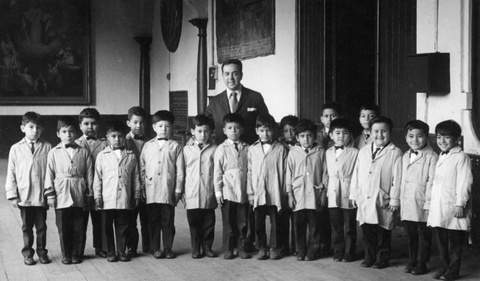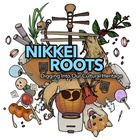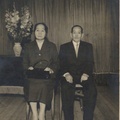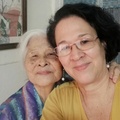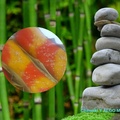My family lived in Barrios Altos, a populous neighborhood in Lima, Peru. We liked being in the store as children, we had a warehouse, contact with people was little, we only thought about playing, waiting for mom to get free and having her attention, we did not have the notion that we were of another race, other traits , that there were good people and bad people.
The three children have gone to a school very close to the house, where we received a kind of preparation for going to school, a kindergarten, a kindergarten, which was half a block from the house. It was at the back of a farm, in the same one where the man who sold the olives, who sold them to my dad for the winery, had his warehouse. In “the little school” it was paid, we had contact with some of the neighbors our age, they also had the same opportunity as us. It can be said that the neighborhood was divided into people who had a good economic position, who wanted a good education for their children, in many cases paid, the others adapted to what they had.
In kindergarten we met the “wealthiest” in the neighborhood, my parents had decided that we should have the least relationship with those in the neighborhood, but that was almost inevitable, they surely wanted to protect us, give us an education that is the best possible, perhaps beyond their possibilities. I don't know how I started to realize it, but they told my parents: “Hey, Chinese, give me a beer,” “Chinese, give me a kilo of sugar,” phrases like that, often without any respect, using familiar names; I also saw that there were very respectful people, and my dad also joked with many of those who came to the store. The problem usually came when people drank liquor, perhaps very cheerful at first, but as the alcohol took effect, some changed their personality.
We didn't know people who were very correct. Their language changed and they even became violent to not pay their bill. As the years went by, I realized that my dad tried to adapt to people, joking, in some cases joining the same game, giving nicknames, he adapted to the neighborhood. For my part, when I started going to kindergarten, I realized that they also called me 'Chinese'. It bothered me because they made fun of me because my appearance was different due to my physical features. I didn't see the differences, but my mother explained them to me:
—Your grandparents are Japanese, we were born in Peru, but since we are different they call us 'Chinese'.
—Then Chinese and Japanese are the same.
—No, but here people don't make differences, they tell us the same.
—Mom, is it bad to be 'Chinese'?
—No, but each one must be called accordingly.
From that moment on, I had to endure, like all Nikkeis, in some cases, people's ridicule, insults, to the point of being bothered. Even our friends played a lot of practical jokes on us. At first it bothered me, especially when my dad didn't say anything, but the tendency, above all, for Easterners, was to bow their heads and not complain. This was influenced because Peru was an ally of the United States in World War II, which made us the enemies, the bad guys in the film.
As a friend who is Tusan tells me, who also made me see that time gave us revenge, years have passed, Japan and China have developed so much that they are admired worldwide, eyes are often on them, so Everything related to the oriental is in fashion, it is a reference, indirectly we are favored. This was taken advantage of by a character from the Peruvian Nikkei colony to be able to enter politics, as several did. It must be recognized that this qualified him with many qualities attributed to the Japanese, even there he polarized national politics, reviving racist ideas among people.
At school it bothered me a lot when they called me 'Chinese', I always clarified it to the person who said it to me, of course sometimes it couldn't be done, because they were an older person or because they were bigger than me. I remember that at school there was a TV advertisement for Tumix chewing gum, in which they made a representation of a chewing gum (its head in the shape of a chewing gum), dressed in a kind of yukata (traditional Japanese clothing made of cotton). They had given him two stripes of eyes, talking to his teacher, like they did in the Kung Fu series, I called him my little grasshopper, so that's why I was the point of ridicule and jokes from all my classmates for a long time.
Years later, I remember it with a smile and it makes me very funny. I have a friend who stopped calling me 'Chinese' and from then on to this day he calls me 'Japanese'. Of course I wasn't either, if I was born in Peru, I was Peruvian. Over time I took it more lightly, I understood that some said it out of affection, and also that we were no longer such children, although on the street you come across one of those who always tries to insult you.
Now I think that although it is true that each person should be told for what they are, in the end we were not Japanese either, the exact term is “ Nikkei ”, but being called 'Chinese' felt like an insult, added to the fact that There were always many who said that we should hate the Chinese, the same thing they told those who are Tusan, that they should hate the Japanese. This enmity comes from ancient times, due to the history of war and the expansionist desire that Japan had until the Second World War, we must recognize that the old people did have that prejudice from both sides. We are part of another generation, I have very good friends who are Tusan, our origin comes from China, being Okinawans, if we analyze all our customs, the majority come from China.
I am “ Nikkei ”, neither Chinese nor Japanese, in our case we are Peruvian by birth, we love the land that welcomed our grandparents, with Japanese roots but proud of them.
*This is an article that I published on my blog De Todo Un Poco , on June 25, 2018.
© 2018 Roberto Oshiro Teruya


